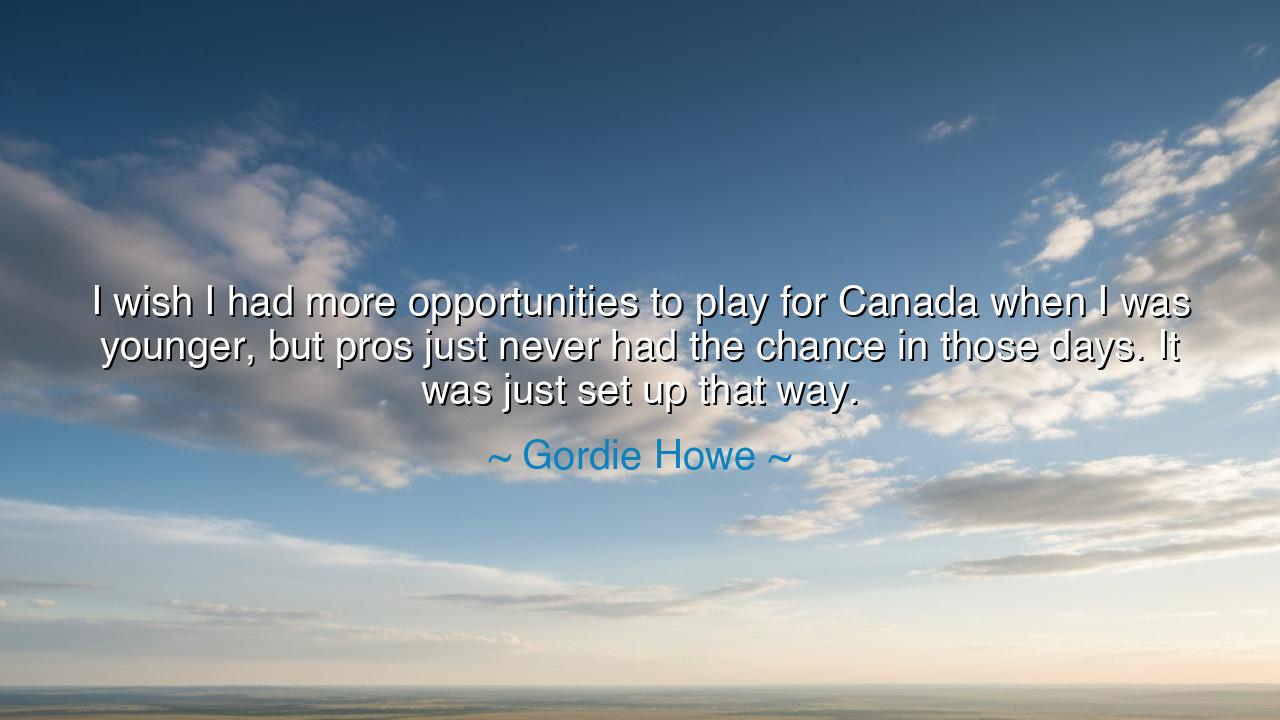
I wish I had more opportunities to play for Canada when I was
I wish I had more opportunities to play for Canada when I was younger, but pros just never had the chance in those days. It was just set up that way.






In the words of Gordie Howe, "I wish I had more opportunities to play for Canada when I was younger, but pros just never had the chance in those days. It was just set up that way," we hear the lament of a man who, despite his remarkable achievements, feels the weight of missed opportunities. These words, though spoken with a sense of acceptance, carry the undercurrent of regret—the quiet longing for what could have been. For Gordie Howe, a legendary figure in the world of hockey, the circumstances of his time prevented him from playing for his beloved Canada in ways he wished. His words speak to the universal truth that often, in life, we are shaped by the times we live in, and opportunities—no matter how hard we strive—are sometimes beyond our control.
His reflection on the limitations imposed by the era in which he played reminds us that history is often an invisible force that dictates the opportunities available to us. In the case of professional athletes, the rules and norms of the past limited their ability to participate in international competitions, and for Howe, this meant missing out on representing his country in ways he deeply desired. The limitations of his time were not of his making; they were the result of a system that had not yet evolved to recognize the potential of professional athletes as ambassadors for their nations. It is a poignant reminder that while our individual dreams may burn brightly, they can sometimes be thwarted by the larger forces of history.
Consider the story of Jesse Owens, whose triumphs at the 1936 Berlin Olympics became one of the most enduring symbols of resistance against racial oppression. Owens, a man of remarkable ability, was given no opportunity to represent his country in a way that celebrated his worth due to the racial prejudices of his time. Yet, despite the absence of these opportunities, Owens triumphed in the face of adversity, his legacy forever intertwined with his ability to overcome the limitations of his era. Much like Gordie Howe’s regret, Owens’s story speaks to the yearning for opportunities denied by a larger societal framework. However, both men, despite the challenges, reshaped the world around them by their achievements and legacy.
Gordie Howe's regret is not just about missing out on opportunities; it is a reflection of a desire to have contributed more to his country. His yearning to represent Canada is not just about playing hockey; it is about pride, patriotism, and the sense of belonging that comes from contributing to something greater than oneself. For Howe, playing for his country would have been a chance to elevate his identity and to honor the rich history of Canadian hockey. This is a truth that transcends the realm of sports. In life, we all seek the opportunity to belong, to be part of something that feels larger than ourselves, something that gives our efforts a deeper meaning.
Yet, Howe’s words also teach us the importance of accepting the things we cannot change. While he expressed regret, he did not wallow in it; he simply acknowledged the reality of the time. In doing so, he showed that acceptance of circumstances beyond our control is a powerful tool for personal peace. The ability to acknowledge the constraints of time—whether in sports, careers, or personal aspirations—is the hallmark of wisdom. This does not mean resignation, but rather a recognition of the greater forces at play. Howe’s recognition that “it was just set up that way” is a form of wisdom that allows us to move forward, to appreciate the opportunities we do have, and to make the most of them.
The lesson here, then, is twofold. First, we must acknowledge the constraints of the world around us, understanding that sometimes our dreams and aspirations will be shaped by forces beyond our control. But second, and more importantly, we must find ways to make our mark despite these constraints. Just as Gordie Howe left a lasting legacy in hockey, despite the limitations of his time, we too are called to find our own path and contribute to the world in the ways that are available to us. In accepting the limits placed on us, we free ourselves to find new opportunities that might have otherwise been overlooked.
Lastly, let us remember that history is always in the process of being written, and while we may face challenges and constraints today, we are never without the power to change the future. Howe’s reflection serves as a reminder that even in the face of missed opportunities, there is always a chance to build a legacy, to make the most of the time and the opportunities that are given to us. And so, as we move forward, let us embrace the challenges of our time, make the most of what we have, and leave a legacy worthy of admiration and respect.






AAdministratorAdministrator
Welcome, honored guests. Please leave a comment, we will respond soon